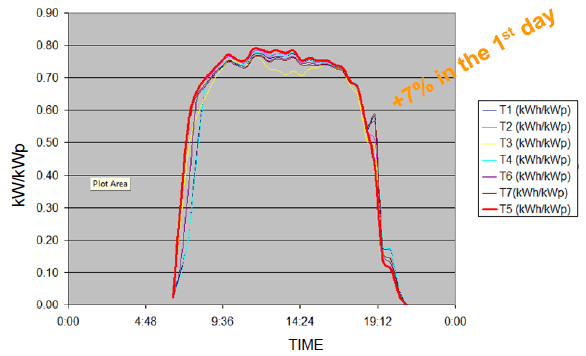RETROFIT WITH DEGER TRACKERS
![]() Are your existing solar systems underperforming with astronomically controlled trackers?
Are your existing solar systems underperforming with astronomically controlled trackers?
![]() Do your tracking systems have damaged parts and is out of warranty?
Do your tracking systems have damaged parts and is out of warranty?
![]() Does your tracking system have not the ability to be upgraded?
Does your tracking system have not the ability to be upgraded?

Then, why do you lock yourself into obsolete trackers and have to watch as other systems outperform yours?
It’s known that MLD technology is the only one that can detect any reflection of light, even in the cloudy landscape, moving the panels to absorb as much sunlight as possible. Your system’s energy output even on a cloudy day will be significantly higher than the days before the upgrade.
Many solar trackers which are operating in the different countries have no longer official technical support, therefore their energy production may not be the best, due to malfunctions and damaged parts.

You are now able to upgrade your solar park installation from third-party tracking systems to DEGER’s unique MLD light detection technology and see your energy output increase from the very next day!









Higher Yield by Retrofitting to the MLD Technology From DEGER
One solar park in the Greek city of Oinofita consists of seven dual-axis astronomical controlled trackers in total. But the owner experienced problems with the tracking functionality of the existing systems, and due to the high maintenance expenses for astronomical tracking, the park operator Kepanape decided on retrofitting to the patented MLD technology from DEGER. The Greek branch manager Ioannis Markopoulos of Degerhellas and his team participated with this project and developed a technique for converting the astronomical systems to a sensor-controlled technology.
The solar park has an installed capacity of 100 kilowatts. To show the effect significantly, a tracker with an installed capacity of 13.4 kilowatts was chosen which was previously equipped with astronomical tracking but also encounters shadowing in the afternoon. The previous control unit was removed and equipped with two MLD sensors from Deger. The effect of the sensor-controlled tracking quickly became apparent. After just one day the yield of the solar modules was improved by 7 percent.

The patented MLD sensors from DEGER continually measure the intensity of the sun and move the PV modules into the most advantageous position.
The modules not only take the solar irradiation into account, but also, for example, light that is reflected from light surfaces, snow or rocks. From the early morning hours, the modules catch the sun light up to the evening and produce energy the whole day.
Australia’s casino culture represents one of the most fascinating and complex gaming landscapes in the world, reflecting broader social, economic, and technological transformations that have shaped the nation’s relationship with gambling. The emergence of comprehensive gaming platforms has provided unprecedented insights into player behavior, preferences, and emerging trends that define contemporary Australian casino culture. Understanding these patterns reveals not only how Australians engage with casino gaming but also how the industry continues to evolve in response to changing demographics, technological innovations, and regulatory frameworks.
The foundation of modern Australian casino culture traces back to the 1970s when the first legal casinos opened their doors, fundamentally transforming the nation’s gambling landscape. Tasmania’s Wrest Point Casino, established in 1973, marked the beginning of a new era that would see casino gaming evolve from a niche entertainment option to a mainstream cultural phenomenon. This historical progression reflects broader changes in Australian society, including urbanization, increased disposable income, and shifting attitudes toward leisure activities.
The regulatory framework that emerged during this period established Australia as a leader in responsible gaming practices while simultaneously fostering industry growth. State-by-state licensing created diverse gaming environments, with each jurisdiction developing unique characteristics that continue to influence player preferences and gaming trends today. The introduction of electronic gaming machines in the 1980s and 1990s further accelerated the industry’s expansion, creating the foundation for the sophisticated gaming ecosystem that exists today.
Modern casino culture in Australia reflects this rich historical legacy while embracing technological innovations that have revolutionized player experiences. The integration of digital platforms with traditional casino offerings has created hybrid gaming environments that cater to diverse player preferences, from traditional table games enthusiasts to technology-savvy digital natives who expect seamless, interactive experiences.
Analysis of contemporary Australian casino culture reveals distinct patterns in player behavior that reflect broader demographic and technological trends. The modern Australian casino player demonstrates sophisticated preferences that extend beyond traditional gaming options, seeking comprehensive entertainment experiences that combine gaming with dining, entertainment, and social activities. This evolution has prompted casinos to develop integrated resort models that cater to diverse consumer expectations.
Digital integration has become increasingly important in shaping player experiences, with comprehensive platforms like https://www.casinozoid.com providing valuable insights into gaming trends and player preferences across different demographics. These analytical tools reveal that Australian players increasingly favor games that combine skill and chance, with poker variants and strategic table games gaining popularity alongside traditional slot machine gaming.
Geographic variations in gaming preferences reflect Australia’s diverse cultural landscape, with metropolitan areas showing different trends compared to regional centers. Urban players tend to favor sophisticated gaming experiences with higher stakes and complex game mechanics, while regional players often prefer more traditional gaming formats with strong social components. These preferences influence casino design, game selection, and marketing strategies across different markets.
The demographic profile of Australian casino players has also evolved significantly, with younger generations bringing different expectations and gaming behaviors. These players demonstrate greater comfort with technology integration, preference for skill-based games, and expectations for personalized gaming experiences that adapt to individual preferences and playing styles.
The technological transformation of Australian casino culture represents one of the most significant developments in the industry’s recent history. Advanced gaming systems now provide real-time analytics that help understand player behavior, preferences, and trends with unprecedented accuracy. This technological infrastructure enables casinos to offer personalized experiences while maintaining responsible gaming practices that protect player welfare.
Mobile technology integration has fundamentally changed how Australians interact with casino gaming, creating seamless experiences that bridge physical and digital environments. Players can now access gaming information, track their activity, and participate in loyalty programs through sophisticated mobile applications that enhance the overall casino experience. This technological evolution has also enabled more effective implementation of responsible gaming measures, including spending limits, time management tools, and self-exclusion options.
Artificial intelligence and machine learning technologies are increasingly being deployed to analyze gaming patterns and predict trends, providing valuable insights that inform both business strategies and responsible gaming initiatives. These technologies enable casinos to identify potential problem gambling behaviors early and implement appropriate interventions while simultaneously enhancing the gaming experience for recreational players.
The integration of cryptocurrency and blockchain technologies is beginning to influence Australian casino culture, though regulatory frameworks continue to evolve in response to these innovations. Early adopters are exploring how these technologies might enhance security, transparency, and player privacy while maintaining compliance with existing regulatory requirements.
Australia’s regulatory approach to casino gaming represents a sophisticated balance between industry growth and consumer protection that has influenced gaming cultures worldwide. The multi-tiered regulatory system, involving both federal and state authorities, creates comprehensive oversight that ensures fair gaming practices while enabling innovation and industry development. This regulatory framework has evolved continuously to address emerging challenges and opportunities in the gaming sector.
Responsible gaming initiatives have become increasingly sophisticated, incorporating advanced technology and behavioral analysis to identify and address potential gambling problems before they become severe. These programs include mandatory staff training, advanced monitoring systems, and comprehensive support services that reflect Australia’s commitment to maintaining a safe and enjoyable gaming environment for all participants.
The regulatory emphasis on transparency and accountability has influenced how casinos operate and market their services, creating a culture of responsibility that extends throughout the industry. This approach has contributed to higher levels of public trust in casino gaming while establishing Australia as a global leader in responsible gaming practices.
Recent regulatory developments have focused on addressing the challenges posed by technological innovation, ensuring that new gaming formats and delivery methods maintain the same high standards of consumer protection that characterize traditional casino operations. This ongoing regulatory evolution continues to shape Australian casino culture while providing a framework for sustainable industry growth.
The comprehensive analysis of Australian casino culture through platforms like Casinozoid reveals a dynamic and evolving industry that successfully balances entertainment, economic contribution, and social responsibility. The trends identified through detailed gaming analysis demonstrate that Australian casino culture continues to adapt to changing consumer preferences while maintaining its commitment to responsible gaming practices. As technology continues to advance and demographics shift, the insights provided by comprehensive gaming analytics will become increasingly valuable for understanding and shaping the future of Australian casino culture. This ongoing evolution ensures that Australia will continue to serve as a model for sustainable and responsible casino gaming development worldwide.
By using this website you accept your privacy policy concerning the use of cookies.
